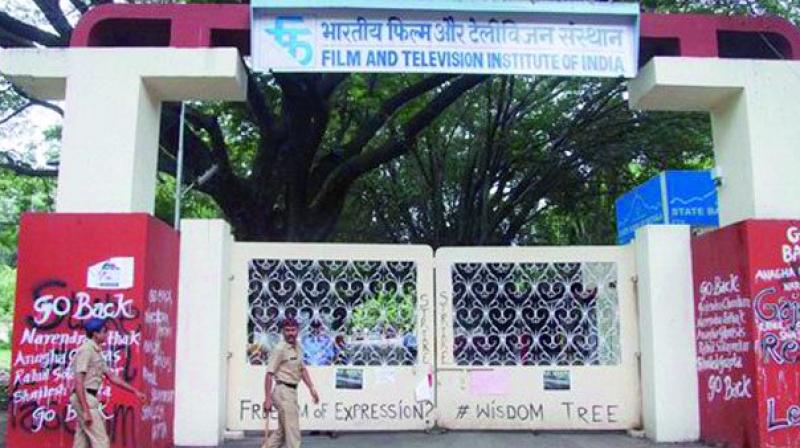Privatisation of film schools

The Narendra Modi government is planning to privatise the Film and Television Institute of India in Pune and the Satyajit Ray Film and Television Institute in Kolkata. According to reports, of the 114 autonomous institutions reviewed by officials of the Niti Aayog and the Prime Minister’s office — in the first phase of the review of 679 autonomous institutions — nearly a third have been listed for “reduction”, or reorganisation, or corporatisation. “Reduction” is euphemism for merging them with other bodies or winding them up completely.
We speak to educators, filmmakers and thinkers on the impact of such a decision.
‘Private schools don’t encourage documentaries’
Gurvinder Singh, director and alumnus of FTII
Specific details about privatisation aren’t out yet. Even the secretary of I&B ministry said she doesn’t know anything about it. We will know of the consequences only once these details are out. Will this prove better for the institution? Would there be better equipment? What will be the selection process for the board of members and faculty? Currently, we are in the dark about this.
However, if the institute is privatised, it won’t be able to sustain itself with the current fee structure. It’s clear that most students getting out of private film schools are geared to get into either the Hindi film industry or regional film industry; although there are exceptions. But in FTII and SRFTI, students think of themselves as budding film artists who try to work as independent filmmakers both with fiction and non-fiction. By and large, privatised film schools do not encourage documentaries and that’s a problem.
‘High fees could deter meritorious students’
Tony D’Souza, Director
The step to privatise Film and Television Institute of India (FTII) in Pune and the Satyajit Ray Film and Television Institute (SRFTI) in Kolkata is a good step towards constructive development. Privatisation would mean in flow of more funds and better management. I don’t mean to say that the management now is inefficient, but it will definitely help to streamline things. However, there is a catch, if after privatisation the course fee is increased, then that will deter many meritorious students to take admission, which could prove bad.
‘Corporatisation will uproot the tenets of these institutions’
Rohin Raveendran Nair, filmmaker and FTII graduate
There are countless film institutes sprouting all over the country offering courses in filmmaking yet two names shine: Film and Television Institute of India and Satyajit Ray Film and Television Institute. It is in these two institutes one can find a beautiful microcosm of India, all hailing from such diametrically opposite class and cultural backgrounds. The low cost of tuition fees ensures that those from remote corners of the nation can also aspire to join these institutes of global repute. And, they know they are in safe hands when they look at the stalwarts who have been part of this institute. But corporatisation by its very nature will uproot these tenets of these institutions. Will such a move by the government ensure that the diversity is not affected or the fee structure is not tampered with?”
‘Nurturing art is critical for any government’
Arha Padman, Film Studies Professor
While it is convenient to argue that privatisation can lead to the institutions becoming more self-sufficient, it also makes it non-accessible for talented students from lower and middle-class households. This goes against the very core idea of why these institutes were set up in the first place. Nurturing art is a critical role for any government.
‘In principle, education should not be privatised’
Anjum Rajabali, screenwriter
In principle, I believe, education should not be privatised. And, film training is a specialised education that requires state support it recurs high cost; be it equipment or other facilities. Film schools need constant upgrading and learning to enter the stage of world cinema. But, as a result of privatisation, the cost of studying in these institutions goes through the roof. Naturally, it will become a place only for the privileged few. Storytelling and art is our cultural ambassador, and we should be attracting more young and talented minds to these institutions especially those who might not have the resources to study here. I’m very saddened by the announcement. Moreover, companies would not necessarily be the best judges of faculty, and students will end up becoming customers while institutions will end up becoming mere service providers. I also believe it is the teacher-student equation that needs to be protected.
‘Privatisation of film institutions isn’t going to make any impact’
Sanal Kumar Sasidharan, Filmmaker
At a time when our country is witnessing privatisation with vested interests of the ruling party, I don’t think privatisation of film institutions is going to make any impact. Look around, you can see that our public institutions already lack freedom. They appoint their favourite people as head of the institution and ban movies that are not in their favour. This situation will only aggravate in the future. Corporates may try to make profit out of it, but vested political interests are more dangerous than that. Besides, I feel that it is high time our attitude towards education changes. Education, to some extent, is self-learning. You don’t need to be an institute product to make a good movie, especially in this age of digital revolution; many have proved that.

